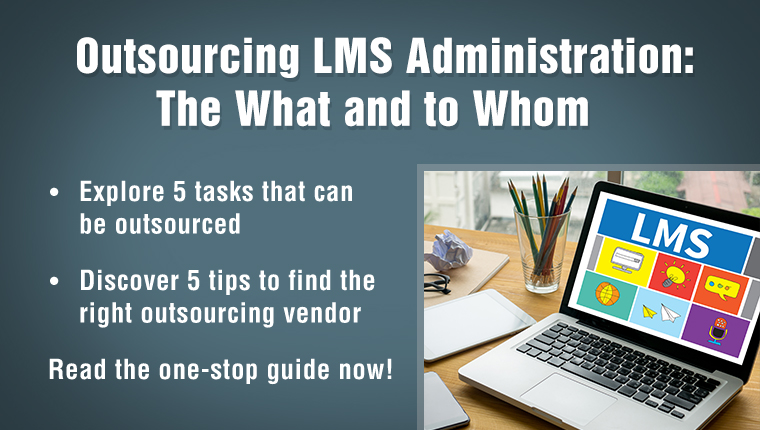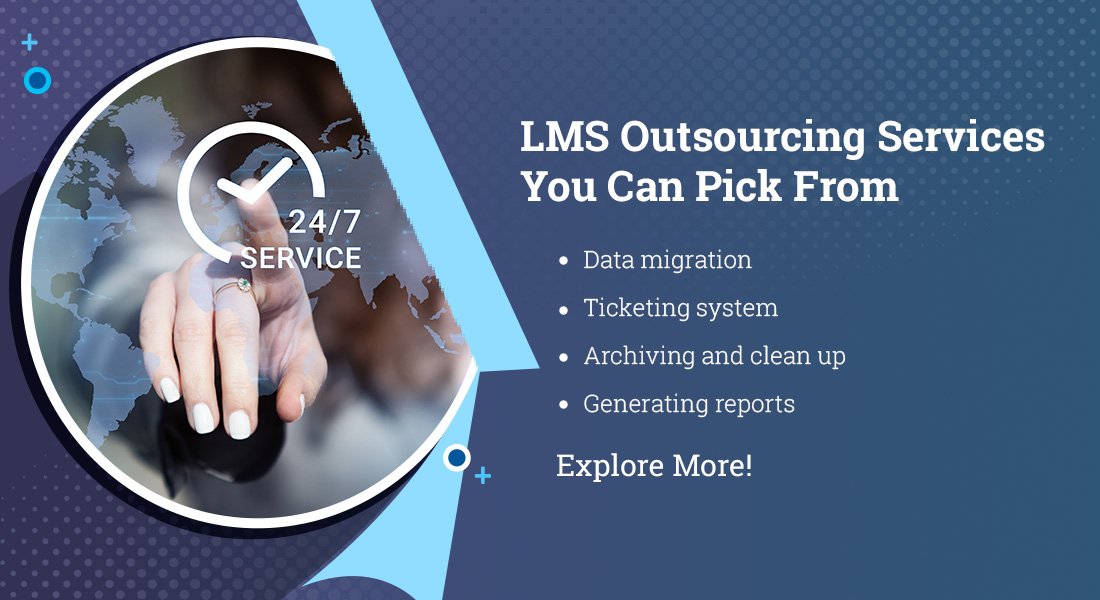Do Away with Headaches: Outsource LMS Administration

Are you planning to shift from traditional ILT to eLearning and looking for a new Learning Management System (LMS)? Let’s say you find the perfect LMS – it fits your budget and your training needs. Then what? You would probably have to assign a team to keep the software up and running or hire one if you don’t have the manpower. But will that be enough? While the LMS is an integral part of your eLearning strategy, managing it requires technical knowledge, not L&D expertise. That is why most businesses prefer to outsource LMS administration.
Outsourcing LMS Administration 101
What Does LMS administration include?
- System set-up
- Standard and customized report generation
- Ticketing set-up
- Data security
- Support activities
What to look for in an outsourcing vendor?
- LMS administration as the core service
- Strong background in L&D
- Experienced team
- Ample manpower
- Firm security plan
But what exactly does LMS administration entail that you need to go through the tedious task of finding a trustworthy LMS outsourcing partner? And how do you even find such a vendor who will provide a dedicated team for your organization’s training needs? In this blog, we will go through a detailed inventory of LMS administration tasks and a checklist to find the right outsourcing partner. So, read on.
Explore a ready reckoner on the What, Why, and How of outsourcing LMS support.
Outsourcing LMS Administration: What Does the Task Inventory Include?
1. System Set-up
The primary work in LMS administration involves standardizing the process of setting up training (both online and offline), uploading eLearning courses, and assigning mandatory and non-mandatory courses to individual learners based on their job roles.
Setting up the system also includes setting up learner profiles, providing access details, and assigning required training programs to them. If you have a large and/or globally dispersed workforce, the administrator will need to create a training catalog based on location, division, job, product line, and more.
2. Standard and Customized Report Generation
Every LMS can generate some standard reports based on learning activities. Traditionally, the LMS focused on learner activities – course progress, completion, scores, difficulty level. In addition to standard reports, the LMS can be programmed to generate customized reports too, based on your training requirements.
Reports generated with modern learning analytics-enabled LMSs are even more nuanced and detailed; often analyzing activities of users outside the LMS, and data from other software like the CRM and HR management tool. Reporting has become an important part of LMS administration because it shows the impact of training and gives actionable insights for improvement. This is certainly one crucial task in outsourcing LMS administration to a vendor.
3. Ticketing System Set-up
With a new LMS, it is very likely that learners, managers, admins, and instructors will require extra assistance for at least the first 6 months. To provide support and answer frequently asked questions, administrators need to set up a ticketing system based on various categories – types of requestors (learners, managers, instructors, administrators) as well as the category of assistance (user account set-up, uploading course, setting up ILT programs). Later the same system can be used to assist newly recruited employees during onboarding training. Hence, to conserve in-house efficiency, you can outsource this part of LMS administration as well.
4. Data Security
Your eLearning courses and content are your organization’s intellectual property. Since everything is hosted in the LMS, extensive security measures are required to prevent piracy, especially if the content is highly sensitive. Securing the LMS from external threats is another important task that falls under the tasks that can be outsourced in LMS administration.
5. LMS Support Activities
LMS support is required by all users, be they learners, instructors, managers, or regional admins. Proper LMS administration will ensure there is an efficient way to deal with any issue faced by any user at any given time.
Support requests may come in for assistance with:
- Access/login details
- Assigning training to learners
- Registering learners to training
- Setting up of user profiles
- Scheduling ILT training
- Uploading courses
- Setting up question banks and quick assessments
- Setting up evaluations/feedback forms
- Troubleshooting/testing
- Roster reports
- Customizing reports
- Bulk registrations/assignments
- Cleaning up LMS
This extensive list must have finally convinced you that you need to outsource your LMS administration. So, here are a few tips to keep in mind while looking for the right vendor.
Outsourcing LMS Administration: How to Find the Right Vendor
1. Look for a Vendor Offering LMS Administration as a Core Service
There are many small and big businesses that provide LMS support. Even LMS product vendors often provide support and administration services. Though that option may ease your initial implementation, it will prove expensive later. You need to look for a vendor who knows your LMS like the back of their hand and can dedicate a team wholly for your benefit.
A vendor offering LMS administration as its core service is better equipped to mitigate not only the technical glitches but also issues related to learning experience.
2. Select an LMS Administration Outsourcing Vendor with Background in L&D
The truth is, while the majority of the LMS administration tasks involve technical expertise, it is ultimately part of Learning & Development. Any IT professional can handle the technical issues of the platform and there is certainly no shortage of them. But LMS administration also involves course sequencing and essentially building learning pathways for learners which requires people with a background in training and development.
Hence, ensure that your vendor has strong background and more so, ample experience in corporate training before you outsource LMS administration to them.
3. Go for a Vendor with an Experienced Team
It is important that you go for a vendor with an experienced team whose expertise lies in handling issues and functionality errors – to ensure the smooth outsourcing of LMS administration. So, while selecting a vendor:
- Ensure the team that is going to work with you has enough experience in handling projects such as yours.
- Check their track record and ask about previous projects that they handled.
- Check if the vendor’s team can effectively coach your in-house team (if you have outsourced the overall administration but still have an in-house team).
- Check the team’s expertise in handling YOUR LMS.
4. Check if the Vendor has the Manpower to Take on your Project
One of the main reasons for organizations opting for outsourcing LMS administration is a lack of manpower in handling large scale projects. While selecting the vendor, ensure they have the manpower to provide constant support and a dedicated team for your LMS.
5. Verify if the Vendor can Address Security Concerns
Your eLearning content is your intellectual property and protecting it is probably one of your primary concerns with outsourcing. So, it is important to find a vendor who not only has a good industry reputation but also has tight security measures in place to prevent any data leaks. To ensure the safety of your data, you can provide:
- Access only to their customer-dedicated LMS administrators
- Laptops that are secure and accessible only via a VPN (Virtual Private Network) channel to learners
Apart from security, you’ll also need an agile project management in place to have a clear route of communication between your in-house team, the vendor’s team, and the L&D team. So, ensure that the vendor has the tools and templates to document and communicate every aspect of the project. Regular follow up meetings with stakeholders are critical to ensure the success of the project.
Summing it Up!
Your LMS is a crucial instrument in determining the effectiveness of your training programs. If you are convinced of the need for outsourcing your LMS administration and know how to go about finding the right vendor, what else are you waiting for? Start your search, shortlist potential vendors, and follow this checklist to find the right vendor.
Apart from outsourcing LMS administration, many organizations are also opting to shift their in-person classroom training to virtual training (either synchronous or asynchronous) considering the current global crisis due to COVID-19. If your organization is one of them, here’s a free resource that might be useful! Download this free eBook to find tips, tools, and solutions to generate excitement and motivation in virtual instructor-led training.



![Outsource LMS Administration and Support for Better ROI [Infographic]](https://blog.commlabindia.com/hubfs/Imported_Blog_Media/lms-administration-outsourcing-info.jpg)
![5-Point Checklist to Select an Outsourcing Vendor for LMS Administration [Infographic]](https://blog.commlabindia.com/hubfs/blogs/learning-management-system-administration-outsourcing-infographic.jpg)
